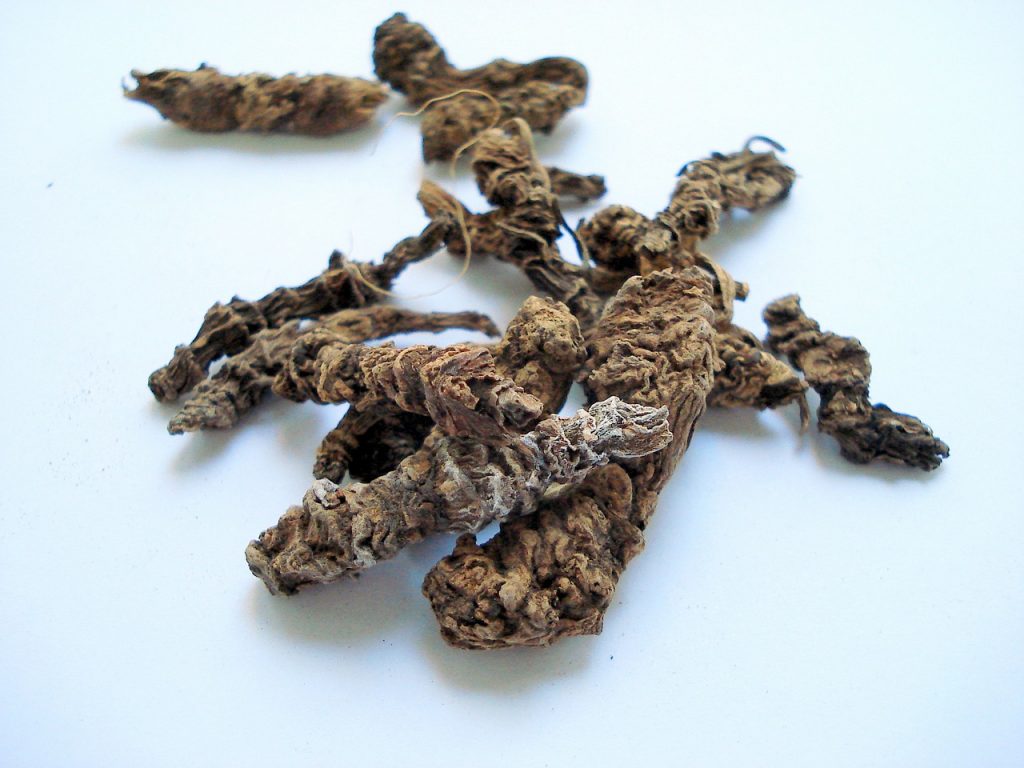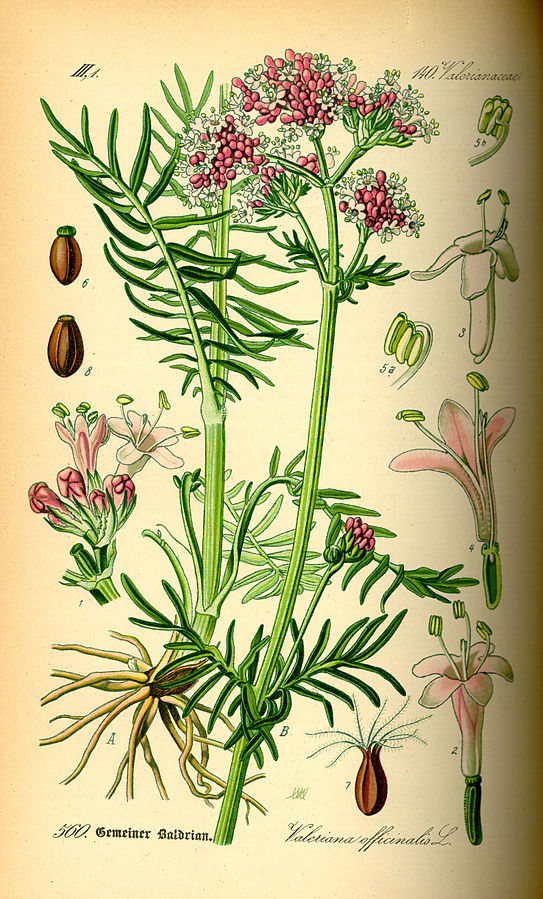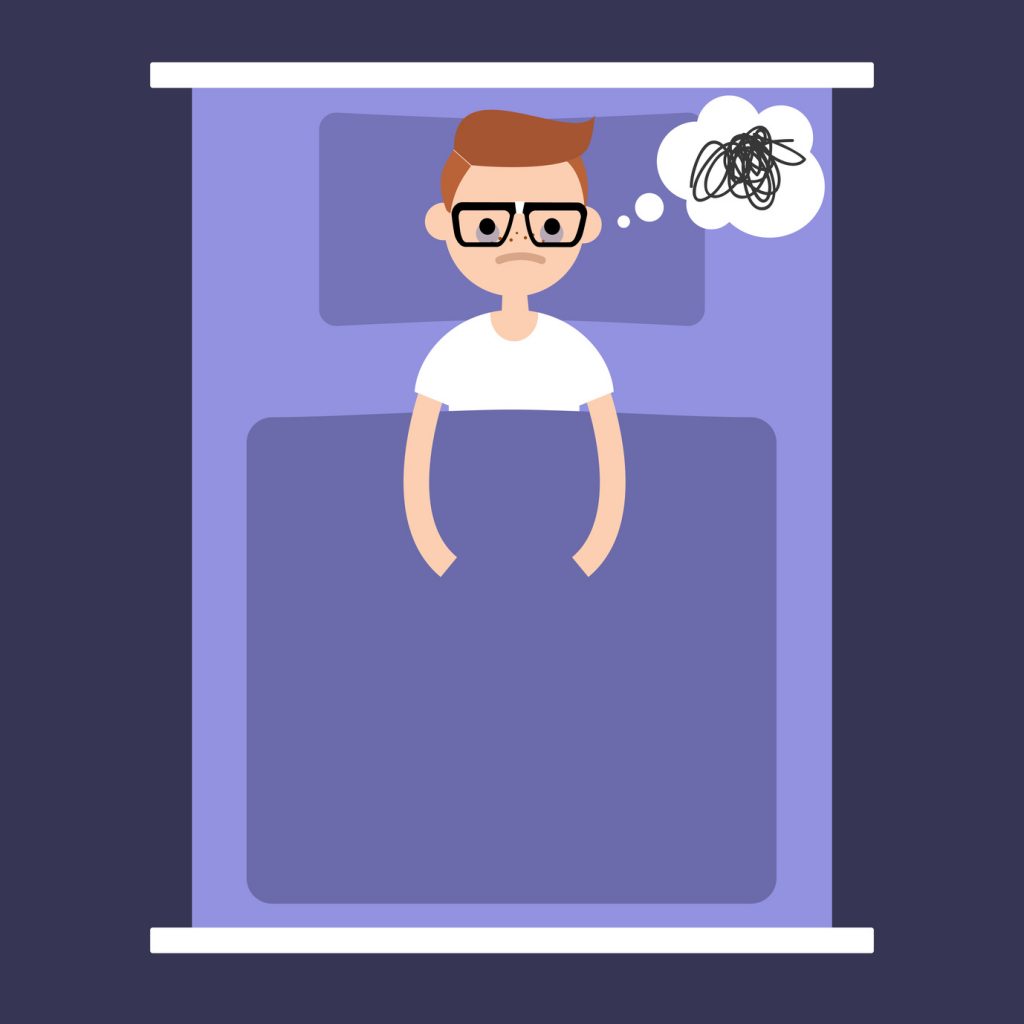
In Connecticut, U.S., valerian is officially banned as an invasive species. In New Brunswick, Canada, it’s listed as a “plant of concern.”
To both locales I suggest consuming a little valerian, chillaxing on that natural reinvigoration, before talking ish on my dogg, better known by the proper name Valerian officinalis. This isn’t a plan I’d mind invading my space: Its late-night relaxation effects are worth it, effectively earning the plant a top spot in my all-natural anti-insomniac stack, to be taken when my mind is running too fast to catch.
However, I don’t include the herb in my day-time nootropic stack, for two prime reasons: 1) Valerian seems to only function as a nighttime sleep aid, and 2) Valerian does nothing for cognition.
So what’s Valerian doing in a Nootropic Geek review?
Just doing what it does: Making the Geek happay.
Page Contents
How Valerian Is Supposed to Work
Valerian is the English analogue of the Latin verb valere, which essentially translates to “to be strong, healthy.” Which leads me to think that all Latin speakers were idiots because valerian is not a strength-inducing herb: It’s for sleeping!
Okay, maybe they’re not idiots: Healthy sleep is a key component to athletic strength & general well-being… The etymology actually makes complete sense, as valerian remains, in my experience, one of the most reliable, effective methods of achieving sleep in otherwise insomniac conditions.
A disclaimer is necessary at this point:
Valerian is not a nootropic, yet I am reviewing it as such, expanding the “cognitive enhancing” concept to include “controlled cognitive shutdown.”

And even that definition of nootropic is unsatisfying considering that, as you will soon read below, valerian’s sedative function does not seem to alter cognition, for better or worse. Leading to the question: What does valerian do?
Here are a couple theories:
GABAergic Activation
Despite the lack of conclusive evidence on valerian’s GABAergic action, researchers seemed to have reasonably settled on the theory that valerian improves sleep via modulation of the GABA receptor. And this bio-activity differs from that of picamilon & phenibut, two anti-anxiety nootropic drugs that deliver GABA compounds to the brain — whereas valerian enhances the GABA receptors’ sensitivity, presumably without affecting actual GABA levels. Or at least that’s what we think is happening: Some research suggests that valerian potentiates and inhibits GABA receptors, the latter effect hypothetically impairing sleep more so than helping it.
This may explain the slightly unreliable nature of valerian’s sleep assistance, although it’s hard to say with certainty at this point.
Dopaminergic Protection
In addition to GABA, dopamine activity also seems to benefit by valerian administration, as valerian compounds have been shown to protect against cell death in dopaminergic neuroblastoma cells. Again, while the outcome of this effect remains unclear, valerian seems to possess a significant neuroprotective benefit, or at least the potential of such, this time with regards to dopaminergic cognitive functionality.
Valerian Benefits
Valerian’s primary intent & benefit: Better sleep quality.

Admittedly, this review is a little out-of-place: Valerian’s almost singularly a sleep aid, potentially an anxiolytic (although, the research isn’t too strong on this point), with no evidence of the herb affecting cognition, positively or negatively. This makes valerian a prime contender for your late-night nootropic stack, but it doesn’t qualify the herb as a singly effective nootropic.
Valerian does not enhance cognition but rather eases the transition to sleep.
And I’m claiming this primarily on its deep history & tradition as a sleep aid botanical, given that the research hasn’t technically reached a conclusive point on its sleep aid value. Perhaps it only helps those who need it? Perhaps. Any answers to the question remain speculative & hypothetical. (Although, I’m personally gambling on this herb.)
Researchers Have Suggested Valerian Might:
Relax brainwave status without cognitive impairment
In this small, placebo-controlled study, NEURAPAS®, a patented mix of St. John’s Wort extract (60 mg), valerian root extract (28 mg), & passionflower extract (32 mg), was evaluated for its effects on EEG-measured brain activity. The study design included NEURAPAS or placebo administration to 16 study subjects, with EEG measures occurring at 0.5, 1.5, 3, and 4 hours after administration, under conditions of various concentration, computational, & memory testings. The results found significantly lower activity in brain centers associated with sedation & anti-depression, as previously established by fluoxetine, an SSRI drug, without any mental impairment. The conclusion: “Analysis of the neurophysiological changes following the intake of NEURAPAS® balance revealed a similarity of frequency changes to those of calming and anti-depressive drugs on the EEG without impairment of cognition.”
Refrain from altering mood or cognitive performance
The study‘s aim: Systematically assess subjective & psychomotor/cognitive effects of various valerian doses in young healthy adults to determine whether valerian altered mood or cognitive performance. Valerian doses ranged through 600, 1200, & 1800 mg, compared against 10 mg diazepam (for positive control) & placebo, administered to 10 volunteers. The results found no significant effects on any of the subjective or cognitive measures, whereas diazepam did impair psychomotor/cognitive effects, leading to the conclusion that “acute administration of valerian does not have mood-altering or psychomotor/cognitive effects in young healthy volunteers.”
Improve sleep quality in menopausal women
This randomized, triple-blind, placebo-controlled study sought to evaluate the sleep-improving effects of valerian extract on insomnia associated with menopause. 100 postmenopausal women aged 50 to 60 were randomly divided into two groups: 530 mg valerian extract or placebo, twice a day for 4 weeks. The results found a significant improvement in sleep quality with the valerian group over placebo, with the former experiencing a 30% improvement in sleep quality. The conclusion: “Valerian improves the quality of sleep in women with menopause who are experiencing insomnia. Findings from this study add support to the reported effectiveness of valerian in the clinical management of insomnia.”
Reduce physiological reactivity to stressful situations
In order to determine the effects of kava kava & valerian on physiological & psychological responses to mental stress, this study administered either kava or valerian to 54 participants following an initial baseline standardized test, followed by another round of testing at the end of the 7 days of supplementation. During the second session, both groups demonstrated decreases in systolic blood pressure with no behavioral changes, while the valerian group also showed decreases in heart rate reaction to mental stress. In conclusion, the researchers stated that “kava and valerian may be beneficial to health by reducing physiological reactivity during stressful situations.” More on Kava Kava.
How to Take Valerian
- Nighttime supplementation: 450 – 900 mg, ~1 hour prior to bed.
- Day-time supplementation: 2 – 3 doses of 300 mg, w/ meals.
- Retail valerian extract standardizes to 0.8 – 1% valerenic acid.
My Experience with Valerian

I don’t care what the research says (or doesn’t say): Valerian works.
Or at least it works for me.
I began with the valerian, chamomile, Tilia estrella combo, simplified the stack down to valerian after I learned the chamomile (a muscle toner) was making my muscles needlessly sore, and I’ve found the herb sufficient in upping my Zzz intake.
Occasionally, if I’m feeling frisky, I switch over to a steeped glass full of kava kava, laying the valerian by the wayside for a night or two, but that has become increasingly rare as lately I’ve been motivated to just get to sleep sooner rather than later. (Kava’s sleep-inducing intoxication is fun, decreasing my chances of actually going to bed.)
Do I consume valerian as a nootropic? No.
Based on my experience, I’m surprised to learn the herb has shown no signs, subjective or performative, of altering cognition. My initial experiences with the herb I openly described as feeling “kind of high.” While I don’t consider the experience as trippy or intense, I refrain from consuming the stuff if I feel I need my mind to accomplish a task — even if that task is easy nighttime reading.
Is Valerian a Good Nootropic?
No, Valerian is not a good nootropic. Nor is it a bad nootropic.
It’s simply just not a nootropic.
Current research indicates that valerian doesn’t alter cognition, a claim I find dubious considering that sleep essentially requires dumbed down cognition, but hey maybe not: A close friend attempted valerian-aided sleep numerous nights and not only couldn’t fall asleep but felt slightly “wired” on each occurrence.
My interpretation: Valerian is conditional upon unknown attributes of the user (GABAergic status?). With that in mind, don’t buy valerian bulk-loads before actually trying the stuff.
I’ll leave it to you to figure out how to try it without buying it.
Overall Valerian Nootropic Power Rating
[yasr_multiset setid=0]
